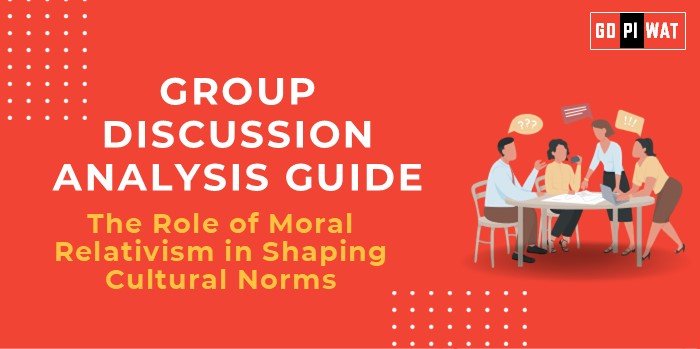📋 Group Discussion (GD) Analysis Guide: The Role of Moral Relativism in Shaping Cultural Norms
🌍 Introduction to the Role of Moral Relativism
Opening Context:
“In a world of diverse cultures and belief systems, moral relativism has emerged as a compelling framework for understanding and shaping cultural norms. It challenges the idea of universal ethical standards and promotes a context-dependent approach to morality.”
Topic Background:
Moral relativism, rooted in philosophical debates dating back to ancient Greece, argues that moral judgments are not absolute but shaped by cultural, societal, and historical contexts. Its relevance has grown in today’s globalized world, where cultures frequently interact and sometimes clash. Recent global debates around gender rights, freedom of speech, and globalization illustrate the critical role of moral relativism in cultural dynamics.
📊 Quick Facts and Key Statistics
- 🌍 Globalization Impact: Over 50% of countries experienced cultural shifts due to globalization (UNESCO 2023).
- 📊 Diversity in Ethics: 72% of global citizens acknowledge cultural differences in defining morality (Pew Research, 2022).
- 💍 Rise of Interfaith Marriages: 39% increase in interfaith marriages globally since 2000 showcases cultural fluidity (World Values Survey, 2021).
- 💡 Global Trade’s Influence: 65% of consumers adapt their lifestyles based on exposure to foreign cultures (McKinsey, 2023).
👥 Stakeholders and Their Roles
- 🎭 Cultural Groups: Define and adapt moral norms within their contexts.
- 🏛️ Governments: Mediate cultural disputes and create policies fostering coexistence.
- 🌐 Global Organizations: UNESCO and WHO advocate for ethical pluralism in global dialogues.
- 🧑🤝🧑 Individuals: Act as agents of change, balancing personal beliefs with societal expectations.
🏆 Achievements and Challenges
Achievements:
- ✅ Cultural Tolerance: Widespread acceptance of diverse practices, e.g., recognition of LGBTQ+ rights in 80+ countries.
- 🤝 Conflict Resolution: Successful integration of moral relativism in peace negotiations (e.g., South African Truth and Reconciliation Commission).
- 🌟 Innovation in Global Ethics: UNESCO’s Global Ethics Observatory promoting context-aware ethics.
Challenges:
- ⚠️ Ethical Fragmentation: Difficulty in reaching consensus on issues like climate change and human rights.
- 📉 Cultural Erosion: Over-reliance on relativism risks undermining core ethical principles.
- 🌍 Polarization: Diverging cultural values fueling political and social divisions.
Global Comparisons:
- 🇯🇵 Japan: Balances modern ethics with traditional values in policymaking.
- 🇸🇪 Scandinavia: Advocates universal moral standards like gender equality while embracing cultural pluralism.
Case Studies:
- 🇮🇳 India: Balancing traditional norms with modern relativism in women’s rights debates.
- 🇺🇸 United States: Tensions between free speech and cultural sensitivity on university campuses.
📄 Structured Arguments for Discussion
- 💡 Supporting Stance: “Moral relativism is essential for cultural coexistence, allowing societies to respect and learn from each other’s norms.”
- ⚔️ Opposing Stance: “Moral relativism undermines universal ethical principles, leading to cultural conflicts and ethical ambiguity.”
- ⚖️ Balanced Perspective: “While moral relativism promotes cultural respect, it must be balanced with shared global ethical standards to address universal challenges.”
🗣️ Effective Discussion Approaches
Opening Approaches:
- 📊 Statistical Opening: “72% of global citizens agree that morality varies across cultures, highlighting moral relativism’s influence in modern societies.”
- ⚖️ Contrasting Opening: “While moral relativism fosters cultural understanding, it often clashes with universal ethical standards like human rights.”
Counter-Argument Handling:
- ✅ “While moral relativism accommodates cultural diversity, it can address universal ethics by identifying shared values across cultures, as seen in global human rights treaties.”
🔍 Strategic Analysis of Strengths and Weaknesses
- ✅ Strengths: Promotes tolerance, reduces ethnocentrism, encourages cultural innovation.
- ⚠️ Weaknesses: Ethical ambiguity, cultural erosion, resistance to universal standards.
- 💡 Opportunities: Enhanced global collaboration, ethical pluralism in governance.
- ⚡ Threats: Polarization, ethical inconsistency, cultural imperialism.
💼 Connecting with B-School Applications
Real-World Applications:
- ⚖️ Ethical frameworks in cross-cultural management.
- 🌍 Designing inclusive policies in multinational organizations.
Sample Interview Questions:
- 💬 “How would you apply moral relativism to manage cultural conflicts in a diverse workplace?”
- 💬 “Discuss the implications of moral relativism for global business ethics.”
Insights for B-School Students:
- 📚 Study cross-cultural ethics in case competitions.
- 🤝 Explore moral relativism in organizational leadership models.


